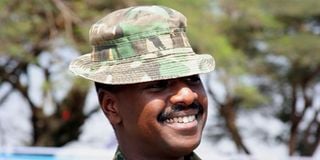Museveni’s son: My father’s party no longer serves Ugandans

General Muhoozi Kainerugaba.
Muhoozi Kainerugaba, President Yoweri Museveni’s son, has launched another offensive at the Ugandan Head of State, this time saying his father’s National Resistance Movement (NRM) party no longer represents Ugandans.
Mr Kainerugaba boasted that he is the best bet the country has for a national leader. This, according to him, is as a result of the deteriorating performance of the ruling NRM.
“I am listening to the outcry of our people for change. I am with the people. Whatever NRM has become certainly does not represent the people of Uganda,” he posted on his Twitter handle on Saturday at around noon.
Three hours later, he tweeted: “We shall jointly (all of together) create the 6th republic. The 1st was Obote, the 2nd was Amin, the 3rd was Obote II, the 4th was Okello and the 5th was NRM. We will be the 6th republic! The greatest epoch in history!”
This is not the first time Mr Kainerugaba is taking an aim at his father. He has also previously expressed interest in replacing his father as the President of Uganda to honour his mother.
In his past comments, he had hailed his mother Janet Museveni, who is also Uganda’s Education and Sports Minister, calling her an angel.
He had also revealed plans of calling for a big youth summit where he will inform the young people in the country of a big plan that he has for them.
Capture Nairobi
In October, Mr Kainerugaba made statements claiming that he would capture Nairobi in less than two weeks.
His Twitter posts caused a diplomatic tiff between the two countries with Uganda’s foreign affairs ministry later distancing itself from the first-son’s utterances, and apologised to Kenya.
“The ministry wishes to emphasise that the government and the people of the Republic of Uganda treasure the existing strong bilateral relationships between the people and the Government of the Republic of Kenya based on our shared history, common values, mutual respect, trust and the desire to build a unified East African Community,” a statement from the ministry read in part.





